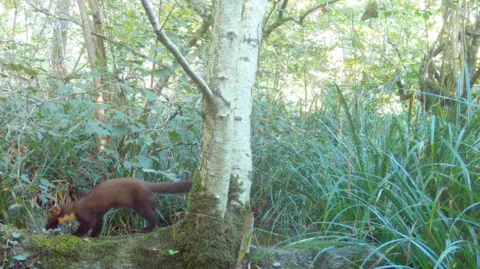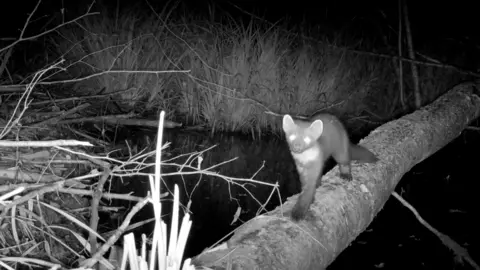Rare mammal that was 'close to extinction' spotted in safari park
A native pine marten has been spotted on the Longleat estate following reintroduction programmes in the Forest of Dean and the New Forest.
The elusive mammal was once common across the UK but habitat loss and hunting had pushed them to the brink of extinction by the beginning of the 20th century.
At one point they were only to be found in the highlands of Scotland, but conservation efforts are starting to yield results.
The Wiltshire Safari Park's conservation and research manager said it was “really exciting” the pine marten had appeared of its own accord rather than through a re-introduction programme.
Dr Tom Lewis remarked Longleat is about half-way between the Forest of Dean and the New Forest where the population of pine martens are starting to recover.
He said while there had been sightings of pine martens around Longleat, nothing had been confirmed until recently.
 Longleat
Longleat Pine marten droppings were found in den boxes set up earlier this year, Dr Lewis said, and one was filmed crossing a waterway by a beaver dam.
“They are notoriously elusive creatures, and it is very exciting not just to have caught one on camera but also to have one living here,” Dr Lewis said.
 Longleat
LongleatPine martens feed on birds, eggs, insect, fruit and small mammals.
They also prey on grey squirrels and many conservationists hope they will help efforts to reintroduce native red-squirrels that are out competed by their grey cousins.
“In this part of the country, we are a long way from seeing red squirrels returning, but the arrival of pine martens is another positive step in the right direction,” Dr Lewis said.
Jim McConkie, head of forestry at Longleat, said: “It is great news. It has been a career goal of mine to work in a woodland with pine martens.
“It shows our management of the woodland habitats and treescape has created the necessary environment to make it an ideal home for them.”
Follow BBC Wiltshire on Facebook, X and Instagram. Send your story ideas to us on email or via WhatsApp on 0800 313 4630.
